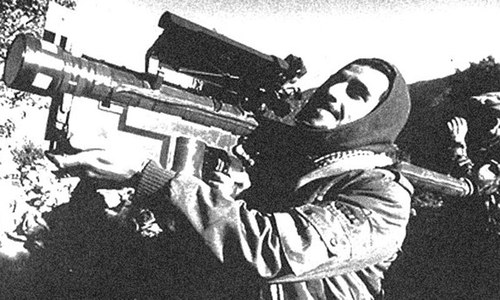MOSCOW: Hundreds of veterans of Moscow’s intervention in Afghanistan on Friday marked 30 years since the pullout of Soviet troops from the bloody conflict that remains an uncomfortable national memory.
Marching with a brass band and dressed in olive-green fatigues, veterans of the decade-long war carried portraits of fallen comrades and a banner with the sign: “We have carried out the orders of the Motherland.” The Soviet Union intervened in 1979 to bolster Kabul’s embattled Communist government against Islamist fighters, and lost more than 14,000 troops in a conflict that contributed to the collapse of the Soviet empire.
“People shy away from (this war). As if it is only our war, while ordinary people are not interested in it,” said Andrei Gusev, who served in Afghanistan between 1984-86.
“Even my children are not interested.” Some efforts to vindicate the war have been made under President Vladimir Putin in recent years, consistent with a militarisation of Moscow’s foreign policy in the Middle East and a growing rift with the West.
A poll published Friday by WCIOM agency said that 42 per cent of Russians believe the intervention in Afghanistan was wrong, while 31 per cent believed it was necessary.
Young people born long after the war were more likely to support the intervention, however, according to poll figures.
The Russian defence ministry on Friday published several previously classified documents about the Afghan war.
The intervention’s goal was to “free contingents of the Afghan army” to enable them to fight the opposition.
However “reality turned out to be much more complicated” and the Soviet Union ended up “sucked into a real war,” the ministry said.
The Soviet Union pulled its last forces from Afghanistan on February 15, 1989, a decision which Mikhail Gorbachev, at the time the Communist Party secretary, continues to endorse to this day.
In an interview with RIA-Novosti published on Friday, Gorbachev said that the pullout decision was taken “after numerous discussions” in which Soviet leadership agreed that “the Afghan problem has no military solution.” In December 1989, Soviet deputies approved a decree that the decision to intervene in Afghanistan “deserves political and moral condemnation.”
Lawmakers in the current State Duma parliament last year suggested this decree should be rejected.
Symbolically, Putin on Friday signed a decree to award Afghanistan war veteran Vladimir Kovtun the top state honour Hero of Russia.
Kovtun was a special forces commander hailed for intercepting a Stinger anti-aircraft missile launcher with a case of US documentation near Kandahar in 1987, the first proof Moscow had of US aid of the Mujahideen.
Published in Dawn, February 16th, 2019













































